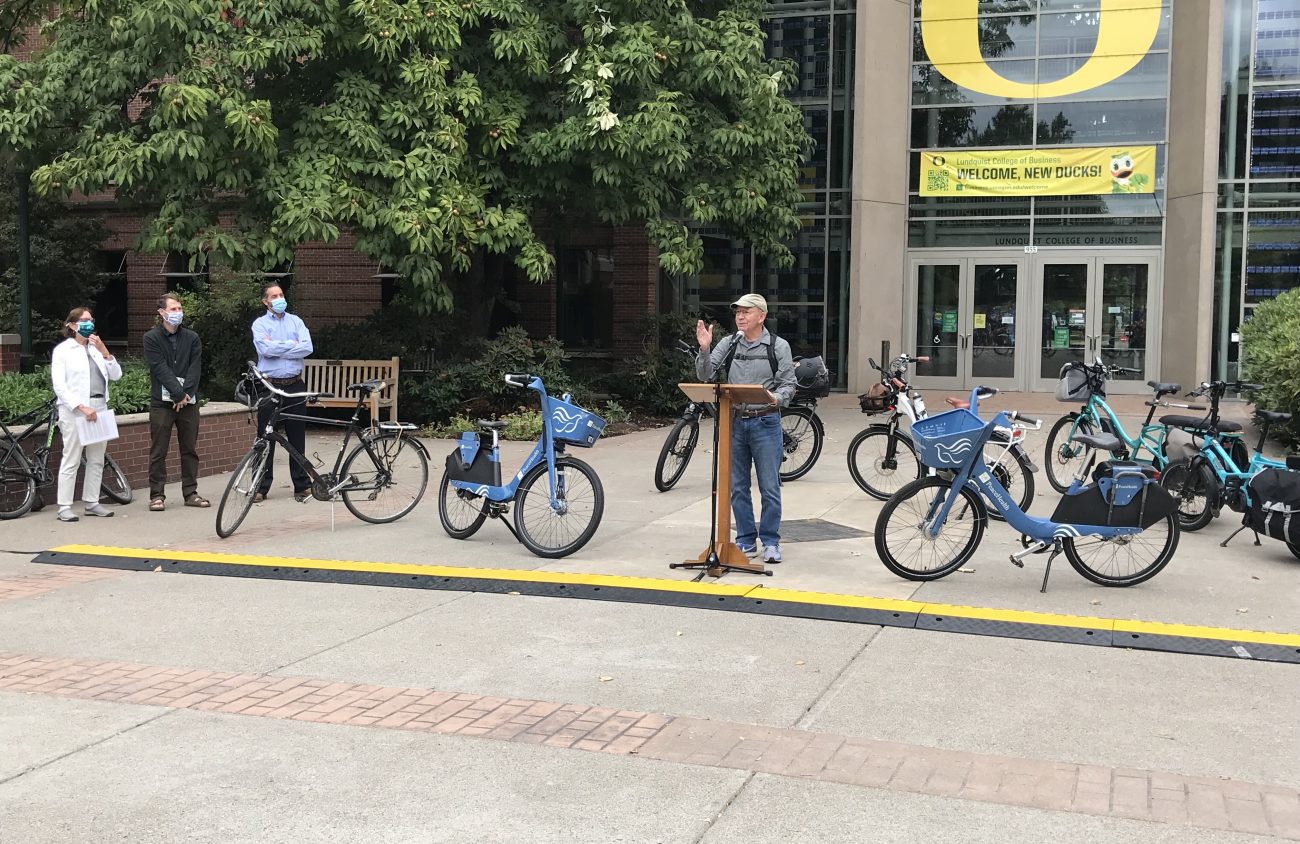Led by a few children, a large group of bicyclists pile into a bike lane on 13th Avenue. It’s a mile-long path separated from car and truck traffic by a concrete barrier. Right behind the children leading the peloton are Eugene Mayor Lucy Vinis and Congressman Peter DeFazio.
At an Aug. 20 press conference, which included speeches from Vinis, University of Oregon Professor Marc Schlossberg and Cascadia Mobility CEO Brodie Hilton, DeFazio spoke about Biden’s $1.2 trillion transportation and infrastructure bill that recently passed the Senate — specifically about how it has money for protected bike lanes. Protected bike lanes, he and the speakers said, get people out of cars and onto bikes, which can lower greenhouse gas emissions.
And to prove the safety of the protected bike lanes, DeFazio and 20 people rode bikes on the city of Eugene’s protected bike lane on 13th Avenue, riding from the UO’s Lillis Complex to Falling Sky’s Oak Alley location.
Vinis isn’t a regular bike rider, she said at the Aug. 20 press conference. So when she rode a bike on the bike lane on East Amazon when it was first completed in 2019, “It was a revelation to me how that felt to be on a protected bike lane,” she said. “The apprehensions I normally have of biking around town were completely eliminated on that bike ride. So it’s something to celebrate and something important to replicate.”
Vinis’ experience is why protected bike lanes are necessary to get people to use bikes for transportation and rely less on fossil fuel vehicles, DeFazio said. The 13th Avenue bike lane that begins outside of the Duck Store and runs all the way to Lincoln Street cost about $2.5 million, he said. “That’s a pretty small investment for the amazing number of students and professors to go to and from school,” he added.
The 13th Avenue protected bike lane was started by UO students who wanted to do something about the missing connection from campus to Eugene’s downtown, professor at the UO’s School of Planning, Public Policy and Management Marc Schlossberg said at the press conference.
But to really cut down on the U.S.’s transportation-related greenhouse gas emissions, Schlossberg said the country has to do more than just build a few protected bike lanes here and there. Projects like the 13th Avenue protected bike lane “needs to happen on all major streets around the country if we’re serious about addressing our serious issues around climate change, household affordability, structural inequality, public health and more,” he said.
“We need connected systems of this bicycle system,” he says, then referring to Copenhagen’s bike infrastructure that DeFazio had praised earlier in the press conference.
Within Biden’s $1.2 trillion infrastructure bill is $5 billion to fund protected bike lanes throughout the U.S. But DeFazio tells Eugene Weekly that his own INVEST Act also has $6 billion for the infrastructure. The INVEST Act passed the House on near-party line votes and is in the Senate now. That federal money would be a generous federal match for municipalities looking to construct protected bike lanes, he adds.
“I’m trying to get more money,” DeFazio says about funding protected bike lanes in Biden’s bill. “It’s a bit of a struggle dealing with the Senate. There’s a lot of climate deniers over there.”
